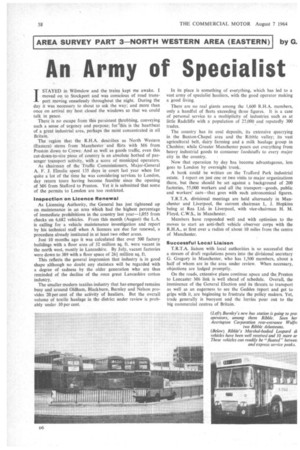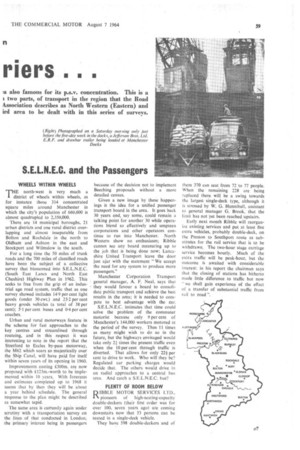An Army of Specialist riers . . .
Page 60

Page 61

If you've noticed an error in this article please click here to report it so we can fix it.
ISTAYED in Wilmslow and the trains kept me awake. I moved on to Stockport and was conscious of road transport moving ceaselessly throughout the night. During the day it was necessary to shout to ask the way; and more than once on arrival my host closed the windows so that we could talk in peace.
There is no escape from this persistent throbbing, conveying such a sense of urgency and purpose; for this is the heartbeat of a great industrial area, perhaps the most concentrated in all Britain.
The region that the R.H.A. describes as North Western (Eastern) stems from Manchester and flirts with M6 from Preston down to Crewe. And as well as goods traffic, even this cut-down-to-size piece of country is an absolute hotbed of passenger transport activity, with .a score of municipal operators.
As chairman of the Traffic Commissioners, Major-General A. F. J. Elmslie spent 135 days in court last year when for quite a lot of the time he was considering services to London, day return tours having become feasible since the opening of M6 from Stafford to Preston. Yet it is submitted that some of the permits to London are too restricted.
Inspection on Licence Renewal As Licensing Authority, the General has just tightened up on maintenance in an area Which had the highest percentage of immediate prohibitions in the country last year-1,055 from checks on 6,682 vehicles. From this month (August) the L.A. is calling for a vehicle maintenance investigation and report by his technical staff when A licences are due for renewal, a procedure already instituted in at least two other areas.
Just 10 months ago it was calculated that over 500 factory buildings with a floor area of 32 million sq. ft. were vacant in the north west, mostly in Lancashire. By July, vacant factories were down to 389 with a floor space of 261million sq. ft.
This reflects the general impression that industry is in good shape although no doubt any statistics will be regarded with a degree of sadness by the older generation who are thus reminded of the decline of the once great Lancashire cotton industry.
The smaller modern textiles industry that has emerged remains busy and around Oldham, Blackburn, Burnley and Nelson provides 20 per cent of the activity of hauliers. But the overall volume of textile haulage in the district under review is probably under 10 per cent. In its place is something of everything, which has led to a vast army of specialist hauliers, with the good operator making a good living.
There are no real giants among the 1,600 R.H.A. members, only a handful of fleets exceeding three figures. It is a case of personal service to a multiplicity of industries such as at little Radcliffe with a population of 27,000 and reputedly 300 trades.
The country has its coal deposits, its extensive quarrying in the Buxton-Chapel area and the Ribble valley; its vast agricultural belt, dairy farming and a milk haulage group in Cheshire; while Greater Manchester pours out everything from heavy industrial goods to consumer foodstuffs to every major city in the country.
Now that operation by day has become advantageous, less goes to London by overnight trunk.
A book could be written on the Trafford Park industrial estate. I report on just one or two visits to major organizations there, but these should be set against a background of 200 factories, 55,000 workers and all the transport—goods, public and workers' cars--that goes with such astronomical figures.
T.R.T.A. divisional meetings are held alternately in Manchester and Liverpool, the current chairman L. J. Hopkins being at Rea Ltd. in Liverpool, with vice-chairman H. M. Floyd, C.W.S., in Manchester.
Members have responded well and with optimism to the moves to start an anti-theft vehicle observer corps with the R.H.A., at first over a radius of about 10 miles from the centre of Manchester.
T.R.T.A. liaison with local authorities is so successful that a stream of draft regulations pours into the divisional secretary G. Gregory in Manchester, who has 1,500 members, about a half of whom are in the area under review. When necessary, objections are lodged promptly.
On the roads, extensive plans continue apace and the, Preston to Lancaster M6 link is well ahead of schedule. Overall, the imminence of the General Election and its threats to transport as well as an eagerness to see the Geddes report and get to grips with it, are beginning to frustrate the policy makers. Yet, trade generally is buoyant and the Ionics pour out to the big commercial centres of Britain.
























































































































